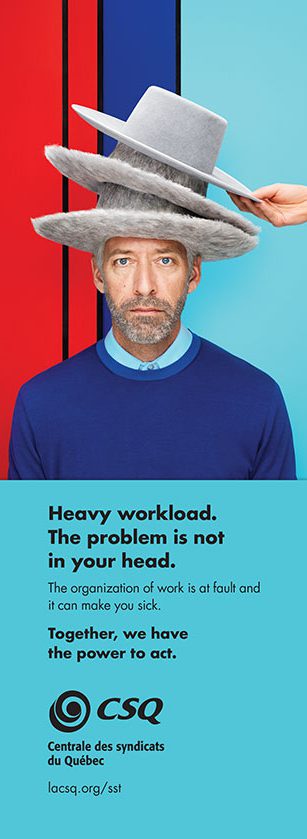According to Angelo Soares1, the public sector is currently facing two glaring problems: unsustainable workloads and a rise in competition and individualism at the expense of cooperation between colleagues.
“Overwork occurs when more is demanded with less. The poor organization of work means less time for cooperation, creating more individualization, which ultimately leads to overwork. It’s a real vicious circle!” summarizes the researcher who led a study among CSQ members in the education and health sectors.
When colleagues no longer collaborate
Management’s lack of attention and availability to provide adequate resources, advice and support to workers, or to resolve conflicts and make decisions, can significantly impact the work environment.
“In this context, a spirit of competition can take over. Bad faith and mistrust set in and it’s everyone for themselves,” says Luc Bouchard2.
Yet when colleagues collaborate and support each other, the climate and quality of life at work are improved. “Social support creates a sense of belonging and solidarity. It promotes a healthy work-life balance,” adds the advisor.
Workloads also affect peer support mechanisms. For example, “a teacher who already lacks planning time will not be inclined to participate in a mentorship program,” says Angelo Soares.
 Who’s to blame?
Who’s to blame?
According to the researcher, neoliberalism – an ideology that proposes reducing the role of the state - has infected the labour market in general: “Our public institutions did no escape it, which has led to significant problems in our schools, vocational centres, CÉGEPs, universities, hospitals, CLSCs, CHSLDs, CPEs, etc.”
Angelo Soares adds, “the state has withdrawn from economic life through deregulation, privatization, and promoting competition among workers. Therefore, there is no incentive to change things. All that matters is individual performance.”
Clear warning signs
In the public sector, leaders are unable to formulate long-term plans that would change this way of thinking, condemns Angelo Soares.
Despite the clear warning signs that our organizations are heading towards disaster, dragging the health of workers down with them, managers are content to act on immediate issues, refusing to take the time necessary for more significant long-term change.
As a result, there are greater numbers of students struggling in class and fewer support staff and professional resources to help teachers integrate these youths well.
64,4 % of CSQ members sleep 6 to 7 hours a night, that is, 1 to 2 hours less than the average canadian (8.12 hours per night).
Collateral damage
This situation is damaging. One in four young teachers abandons their profession before reaching their fifth year. Professional staff are exhausted and can no longer put out fires all day long. Special education technicians and childcare workers, tired of precariousness in these difficult conditions, find employment elsewhere, often reluctantly.
In the health and social services sector, there are more patients and fewer nurses. And when these nurses don’t get sick, they are required to perform mandatory overtime.
“The foundation of these problems is clearly organizational,” says Angelo Soares.
Physical and psychological health risks
The researcher points out that overwork and a lack of workplace support are two of the factors that can lead to psychological distress, mental health problems, and even significant musculoskeletal disorders that are costly for the community.
As work intensifies, so do the physical, intellectual, and psychological demands made on workers. “Several studies show that a heavy workload can also lead to cardiovascular problems and increased absenteeism,” explains Luc Bouchard.
He adds that poor social support from co-workers or supervisors can create an unhealthy workplace environment and negatively impact workers’ health. “It can generate tension and conflict, leading to a variety of problems, including absenteeism, depressive symptoms, and psychological distress,” he says.
According to the INSPQ3, in a context where work is intensifying and changes occur more frequently, social support is an important protective mechanism for preventing occupational health problems. Support can manifest in many ways. For example, colleagues may offer help to overcome difficulties, share tasks, divide work during peak times, and take time together to discuss ways of doing the job.
The situation is a far cry from the ideal that public sector workers aspired to when they chose to devote their lives to the service of others. And this is the root of the problem, says Angelo Soares. He goes on to say, “this dissonance between the personal values and realities of workers creates tremendous pressure and is a major stake in the retention of personnel. Passion is not enough, neither is vocation!”
Only 1/3 of education workers do not work on weekends.
 It’s not in our heads
It’s not in our heads
According to Angelo Soares, “the problem is a collective one and we must fight it collectively.” We must name problems and act on the organization of work at the local level.
“These problems are not imagined and the solutions exist in the minds of the workers. Every member of the CSQ holds a key to change things,” he concludes.
Pitfalls to avoid
To cope with intensification word, workers rely on three popular strategies:
- Working during personal time, for example, at home on weekends instead of spending time with family.
- Doing more things at the same time, such as making phone calls during their commute home, or making corrections while on public transit.
- Arriving before the start of a shift or staying after to become acquainted with or complete files in progress.
However, these strategies are not very effective and should be not be favoured.
1 Angelos Soares is a sociologist and professor in the Département d’organisation et ressources humaines de l’École des Sciences de la gestion at the Université du Québec à Montréal.
2 Luc Bouchard is an occupational health and safety advisor at the CSQ.
3 Institut national de santé publique du Québec.
